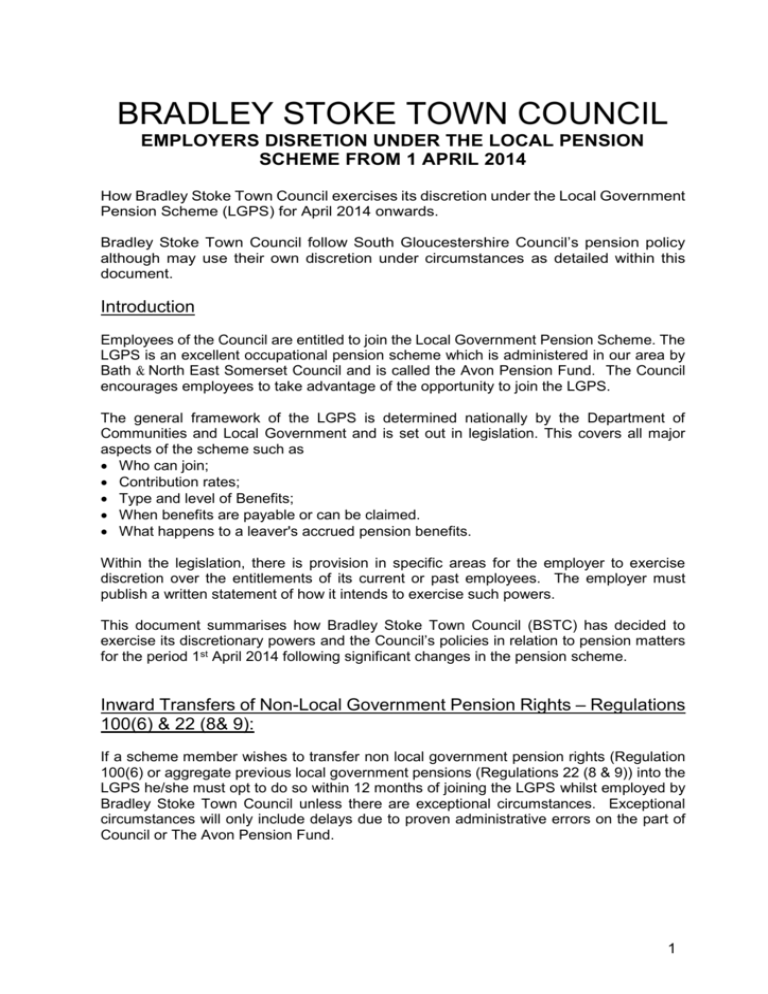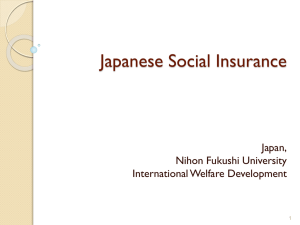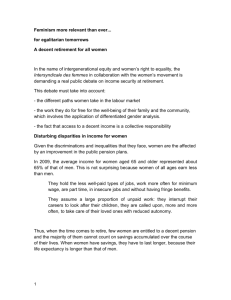BSTC Employers Discretions under Local Pensions Scheme from
advertisement

BRADLEY STOKE TOWN COUNCIL EMPLOYERS DISRETION UNDER THE LOCAL PENSION SCHEME FROM 1 APRIL 2014 How Bradley Stoke Town Council exercises its discretion under the Local Government Pension Scheme (LGPS) for April 2014 onwards. Bradley Stoke Town Council follow South Gloucestershire Council’s pension policy although may use their own discretion under circumstances as detailed within this document. Introduction Employees of the Council are entitled to join the Local Government Pension Scheme. The LGPS is an excellent occupational pension scheme which is administered in our area by Bath & North East Somerset Council and is called the Avon Pension Fund. The Council encourages employees to take advantage of the opportunity to join the LGPS. The general framework of the LGPS is determined nationally by the Department of Communities and Local Government and is set out in legislation. This covers all major aspects of the scheme such as Who can join; Contribution rates; Type and level of Benefits; When benefits are payable or can be claimed. What happens to a leaver's accrued pension benefits. Within the legislation, there is provision in specific areas for the employer to exercise discretion over the entitlements of its current or past employees. The employer must publish a written statement of how it intends to exercise such powers. This document summarises how Bradley Stoke Town Council (BSTC) has decided to exercise its discretionary powers and the Council’s policies in relation to pension matters for the period 1st April 2014 following significant changes in the pension scheme. Inward Transfers of Non-Local Government Pension Rights – Regulations 100(6) & 22 (8& 9): If a scheme member wishes to transfer non local government pension rights (Regulation 100(6) or aggregate previous local government pensions (Regulations 22 (8 & 9)) into the LGPS he/she must opt to do so within 12 months of joining the LGPS whilst employed by Bradley Stoke Town Council unless there are exceptional circumstances. Exceptional circumstances will only include delays due to proven administrative errors on the part of Council or The Avon Pension Fund. 1 Contribution Bands as at 1/4/14 Employees are to pay contributions according to the following table (as at 1/4/14) based upon their actual pay which is the annual salary plus over-time and other payments etc but excludes certain expenses such as the mileage allowance (or 50% actual pay for the 50/50 option) as follows. 2014/15 SCALES Contribution Band Range rate 1 £0-£13,500 5.5% 2 £13501 - £21000 5.8% 3 £21001 - £34000 6.5% 4 £34001 - £43000 6.8% 5 £43001 - £60000 8.5% 6 £60001 - £85000 9.9% 7 £85001 - £100000 10.5% 8 £100001 - £150000 11.4% 7 more than £150001 12.5% 50/50 Section 2.75% 2.90% 3.25% 3.40% 4.25% 4.95% 5.25% 5.70% 6.25% Unlike the 2008 Scheme, it is proposed that pay bands will not be increased in line with the RPI or CPI every April. Instead, contribution rates & bands will be reviewed in line with the triennial actuarial pension valuations. Regulation 9(3) For ease of administration and implementation and to ensure a fair and consistent transition to the new rates, BSTC has determined the following arrangements will apply for 2014/15 onwards. a. Existing Scheme members will be placed into one of the above bands on the basis of their actual pensionable pay as at 1 April 2014. b. New joiners to the Scheme on or after 1 April 2014 will be placed into a band based on their known pensionable salary as at their date of joining the Scheme. c. Scheme members, who have an increase in salary part way through the year as a result of a change in post or re-grading that takes them into a higher band, will be moved into that band with affect from the start of the next monthly available pay period. d. Scheme members, who have a decrease in salary that places them in a lower band, will be moved to the lower band with affect from the start of the next available monthly pay period. e. The contribution band for a part-time employee will be assessed on their actual pay. f. Actual pay of all members will be reviewed quarterly to determine projected actual pay and bandings may be amended linked to this review. 2 To Grant Widower's Pensions for Service Between 1972 and 1988 Some previous Regulations did not allow married female employees to count their service between 1972 and 1988 for a widower's pension unless they paid for it by additional contributions or loss of lump sum. The Council has already used its discretion under more recent Regulations to effectively grant this entitlement to female employees with such service at no cost, thus bringing their position in line with married male employees. Power of Employing Authority to Award Additional Pension (Regulation 31, 16(2)(e) and 16(4)(d) The Council has discretion to award a member additional pension of not more than £6,500 a year (Regulation 31). Council will not normally use this power with the possible exception of early retirements, redundancy or retirement in the interests of efficiency which are also dealt with at a later stage in this document. The Chairs of Council and Committees will form a Staffing Committee to consider each case as and when they arise. Members of the Avon Pension Fund may choose to enhance their pension benefits by purchasing additional pension up to a maximum of £6,500 by paying Additional Pension Contributions (APCs) (Regulation 16(2) (e)) and council has the discretion of contributing to this cost. As Council already makes a significant contribution to the Avon Pension Fund for its employees, it will not normally use this power but may in exceptional circumstances. The Chairs of Council and Committees will form a Staffing Committee to consider each case (where applicable) as and when they arise to determine an exceptional circumstance which will then be defined. Members of the Avon Pension Fund may choose to enhance their pension benefits by purchasing additional pension up to a maximum of £6,500 by paying lump sums (Regulation 16(2) (d)) and council has the discretion of contributing to this cost. As Council already makes a significant contribution to the Avon Pension Fund for its employees, it will not normally use this power but may in exceptional circumstances. The Chairs of Council and Committees will form a Staffing Committee to consider each case (where applicable) as and when they arise to determine an exceptional circumstance which will then be defined. Permanent ill-health Bradley Stoke Town Council will generally follow South Gloucestershire Council’s procedure who has made arrangements for professional and independent occupational health advice from IMASS. Bradley Stoke Town Council may also choose to appoint an Occupational Health Doctor from the approved list as issued by the Avon Pension Fund. If the Occupational Health Doctor certifies that an employee is “permanently incapable of discharging efficiently the duties of their relevant town council employment because of ill-health or infirmity of mind or body and, if so, whether that condition is likely to prevent the employee from carrying out other gainful employment within a reasonable time of leaving local government employment or, as the case may be, before reaching normal retirement age”, the employee will be entitled to the immediate payment of their accrued pension benefits, without abatement, together with additional benefits as laid down within the LGPS regulations. The ill health tiers which will apply, as 3 specified by the LGPS Regulations, will be determined by the Occupational Health Doctor’s report and the Council Staffing Committee and the LGPS Regulations. There are no specific age restrictions on an ill-health retirement, however members must have retired from The Avon Pension Fund by the day before their 75th birthday. If the ill-health retirement is as a result of an injury or disease contracted in the course of the person's employment, he/she is entitled to be considered for an Injury Allowance. Council will adopt South Gloucestershire Council’s Injury Allowance Scheme in such circumstances which provides for benefits to be paid having regard to the person's service and degree of incapacity. The Council may also take account of any contributory negligence on the part of the employee and any other benefits which may be paid including ill-health pension and State benefits. Early Retirement Normal current retirement age under the LGPS is the same as the members state pension age (but will be subject to any future adjustments within the pension fund as advised by the Avon Pension Fund) and benefits may normally be paid from this age. Individuals who choose to retire at any time from age 55 may elect to receive their accrued pension benefits early, however, their pension benefits will be actuarially reduced unless an employer’s discretion applies. Under the new regulations, the rule of 85 will not apply (in cases where the rule would have been satisfied – see basic definition on page 5) for any employee aged 55 or over but not yet 60 who chooses to retire, unless an employer’s discretion applies. Employers Discretions Employers have discretions to decide policy within the following areas: Early Retirement (age 55+) The Rule of 85 Protections (age 55 to 59) and (55 to 65); Flexible Retirement (Age 55+); Redundancy (age 55 or over); Retirement in the interests of efficiency (age 55 or over). The Chairs of Council and Committees will form a Staffing Committee to consider each case (where applicable) as and when they arise. Early Retirement for Ages of 55+ (Regulation 30(8)) Under normal circumstances an employee aged 55 or over, who wishes to voluntarily retire, is entitled to the early payment of pension benefits with an actuarial reduction. Employers have discretion whether to waive all or part of the actuarial reductions applied to a members post 31/3/14 benefits and council will only consider such cases on compassionate grounds or if it is in the interests of council. If the Council agrees, the accrued pension entitlement will be paid either without an actuarial reduction or with a reduced actuarial reduction for early payment, but normally with no augmentation or enhancement. Also refer to Regulation 1(1) C concerning Rule of 85 Protections on page 5. 4 The Staffing Committee will have discretion to determine whether it is beneficial for council in which case they will also have discretion whether or not to pay the accrued pension without an actuarial reduction or with a reduced actuarial reduction. The Staffing Committee will also have discretion in cases of early retirement on compassionate grounds which will be defined as cases where it can be demonstrated that the person is unable to continue working or resume employment due to circumstances outside of their control. Examples of compassionate grounds will include the need to look after and care for a dependent spouse. Financial reasons alone will not be considered sufficient grounds for compassionate approval. In such cases, The Staffing Committee will have discretion whether to pay the accrued pension without an actuarial reduction or with a reduced actuarial reduction. Rule of 85 Protections For Ages 55+ This relates to the allowing of ‘rule 85 protections’ when pension benefits are paid early. In simplistic terms the rule of 85 is achieved when an employee’s length of pensioned service and age at retirement added together achieve 85+. An example would be a scheme member age 60 with 25 years pension membership. They will meet the required criteria and will be protected from an actuarial reduction if rule 85 protections are applied. The level of actuarial reduction protection will vary from part to full depending on a number of factors at the time of retirement. Rule of 85 Protections for benefits taken before the age of 60 (between the ages of 55 to 59) (TP Regs 1(1)c of Sch. 2 Under the new regulations, employers now have discretion to allow the rule of 85 to apply in full for qualifying employees choosing to retire early between the ages of 55 and before the age of 60. Such applications will not be approved by Council as from 1st April 2014 unless there are clear compassionate grounds to do so or it is in the interests of council. In such cases, The Staffing Committee will have discretion to determine whether it is beneficial for council on a case by case basis and they will accept compassionate grounds to be defined as cases where it can be demonstrated that the person is unable to continue working or resume employment due to circumstances outside of their control, for example to look after and care for a dependent spouse. Financial reasons alone will not be considered sufficient grounds for approval. Rule of 85 Protections for benefits taken between the ages of 55 to 65 (on compassionate grounds only) (Regs 2(1) of Sch. 2 Under the new regulations, employers now also have discretion to waive the actuarial reduction to benefits payable under the ‘rule of 85 protections’ on compassionate grounds only for members retiring between the ages of 55 to 65. Council will consider each application individually and if approved will waive the actuarial reduction to benefits payable under the ‘rule of 85 protections’ In such cases, The Staffing Committee will consider each case individually and will accept compassionate grounds to be defined as cases where it can be demonstrated that the person is unable to continue working or resume employment due to circumstances outside of their control, for example to look after and care for a dependent spouse. Financial reasons alone will not be considered sufficient grounds for approval. 5 Flexible Retirement (Benefits Regulation 30(6)) An employee who is aged 55 or over can request the Council to allow him/her to access pension benefits whilst still remaining employed by the Council. Flexible Retirement is aiming to assist a more gradual move into retirement over a period of years, by allowing an employee to work fewer hours and/or in a less demanding job, whilst at the same time drawing their pension. This may be of benefit to the employee, and also the Council in terms of retaining the services of the employee. The key factors in this scheme are: The acceptability to the employee of the level of pension he/she would receive. The willingness of the Council to agree to the specific flexible retirement requested. The employer’s discretions in such cases are Whether to allow the flexible retirement Whether to waive any actuarial reduction to benefits The Council's policy on Flexible Retirement is that an application will only be approved where: The Flexible Retirement will provide benefits to the Council, for example financial savings or the facilitation of organisational or staffing changes and will not result in any detriment to the level of service. If the request is to work reduced hours, the Council's assessment must be that there would be no operational problems caused, or recruitment difficulty anticipated, in making up the reduced hours. If the request is for a move to a lower graded post, this would be subject to an appropriate vacancy arising and the operation of the Council's normal recruitment procedures in filling the post. There are no pension costs to the Council arising from the employee's flexible retirement. Council will not normally use the power to waive an actuarial reduction but council may, in exceptional circumstances. The Staffing Committee will consider each case (where applicable) as and when they arise to determine an exceptional circumstance which will then be defined. Given the above policy, it is anticipated that in practice, Flexible Retirement is likely to be more applicable to those employees aged 60+ and where there is no "strain on the fund" - pension costs to the Council. Redundancy If the Council terminates an employee by reason of redundancy, the employee, if aged 55 or over, becomes automatically entitled to the immediate payment of accrued pension benefits without any actuarial reduction for early payment. 6 Retirement in the Interests of Efficient Exercise of Local Authority Function (RIEELAF) If the Council terminates an employee by reason of RIEELAF, the employee, if aged 55 or over, becomes automatically entitled to the immediate payment of accrued pension benefits without any actuarial reduction for early payment. Forfeiture of Pension Rights after Conviction of Employment-Related Offences - Regulation 91 There are provisions whereby If a scheme member is convicted of, and ceases employment as a result of, an offence in connection with his/her employment which was gravely injurious to the State or liable to lead to a serious loss of confidence in the public service, the employer can apply to the Secretary of State for the issue of a forfeiture certificate. If a certificate is issued the employer may direct that any of the person’s rights be forfeited. The council reserves the right to exercise this discretion in wholly exceptional circumstances. Adopted by Bradley Stoke Town Council – 9th July 2014 7





